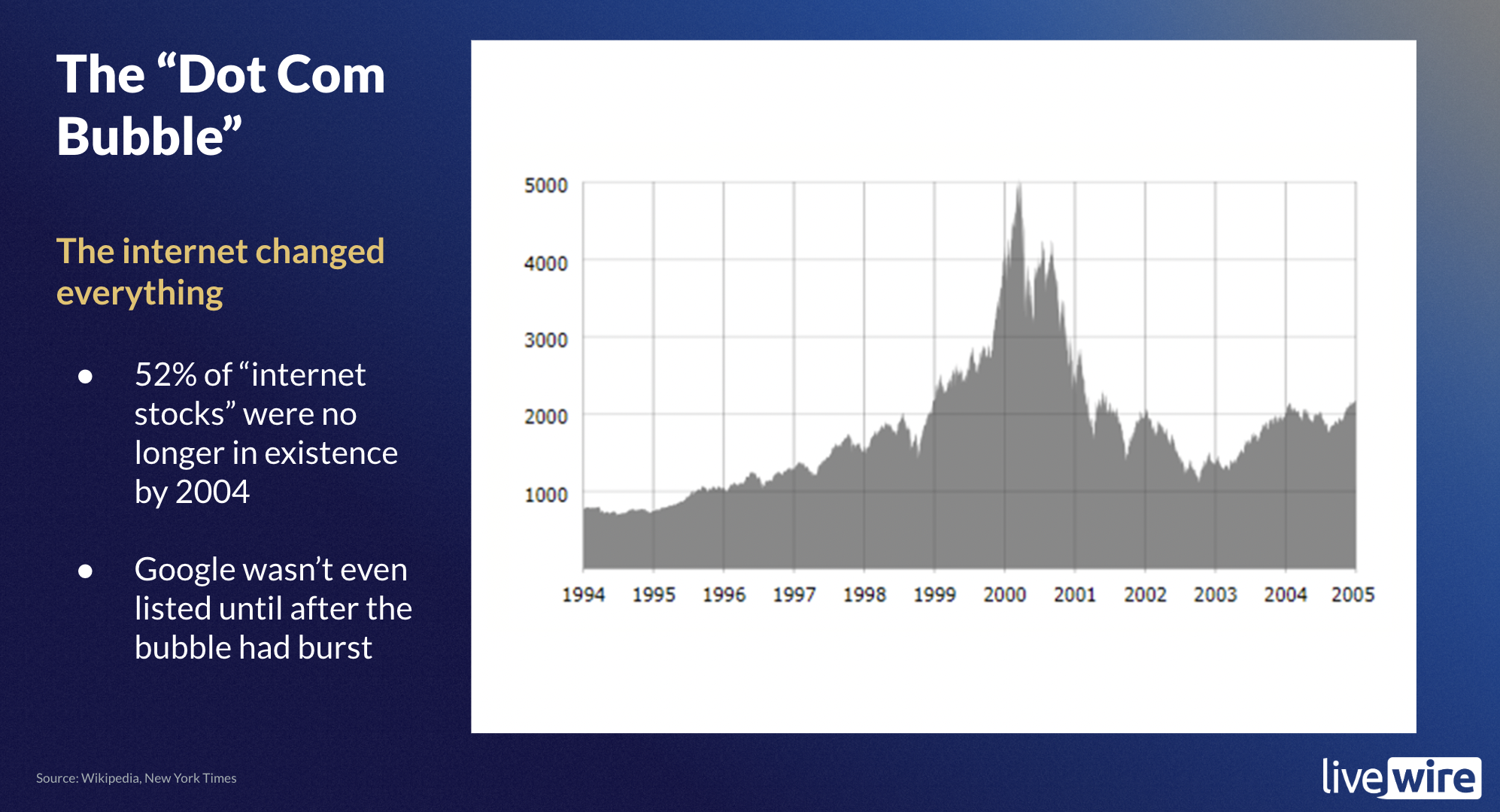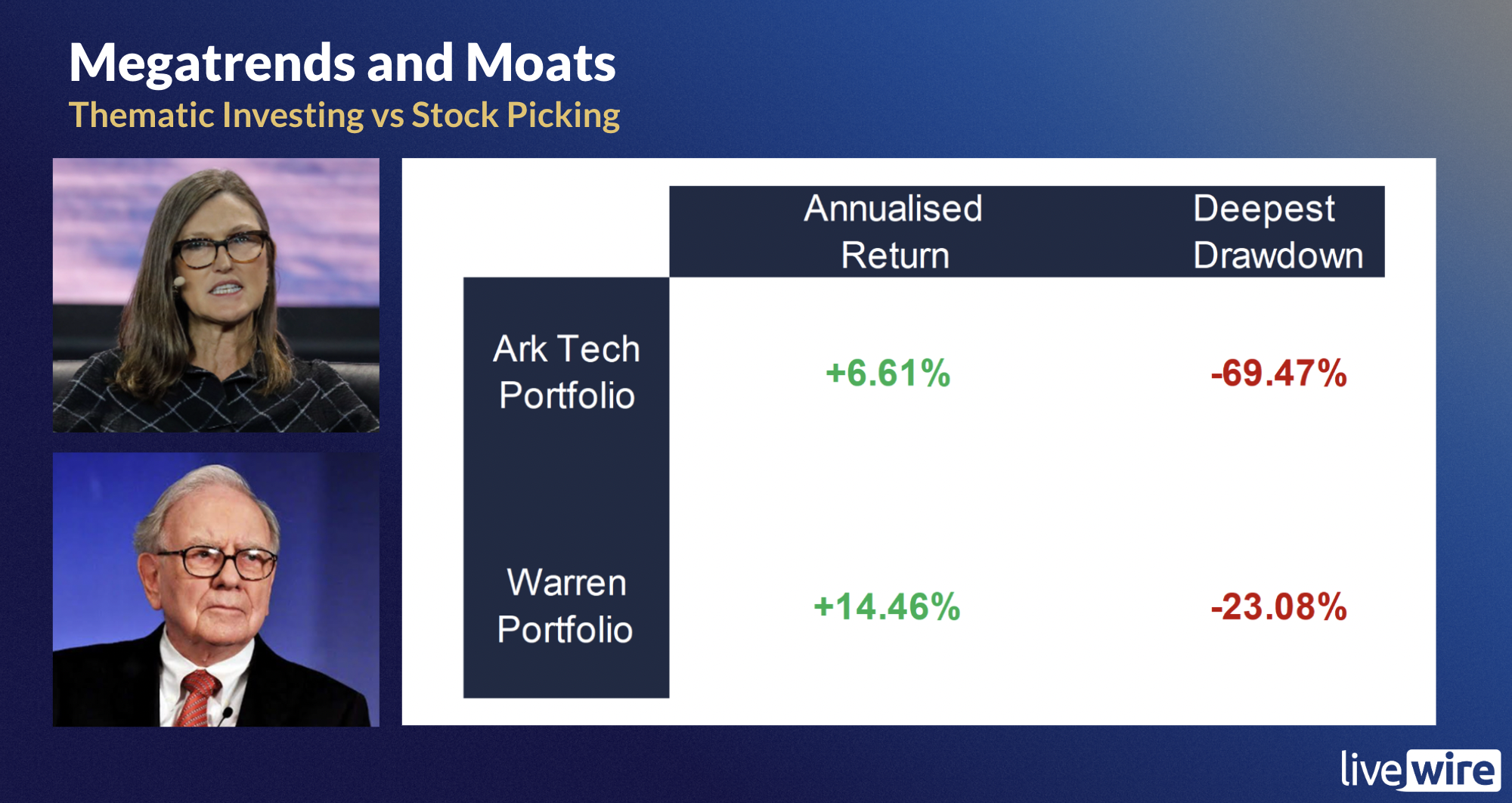Why you'll significantly underperform investing in hot themes
"If you go back and use dairy as an example - we got to the point where Gerry Harvey was buying dairy assets in his listed vehicle, Harvey Norman; Maggie Beer ended up with a dairy asset within her listed vehicle; and Gina Reinhardt, again, was part of the buying frenzy," QVG Capital's Josh Clark said.
Unfortunately, not all thematics work, he added.
"Jerry, I think, was all in for $75 million. That asset went into administration. Maggie Beer's asset was losing $28 million and was up for sale. And Gina's probably the smartest of all three because she doesn't publish her financials," Clark said.
All of this is to say that Clark thinks that thematic investing will perpetually underperform. In this wire, I'll summarise why he believes that to be the case, as outlined in a recent presentation at Livewire Live 2024 in Sydney.
Note: These quotes were taken from Josh Clark's presentation at Livewire Live 2024 on 17 September 2024.
Why do people chase themes?
Clark posits that investors chase themes thanks to behavioural economics, namely, confirmation bias.
"You can see the thematic happening in the real world. The extension of that is if I can see confirmation of that thematic, the companies that are associated with that thematic will benefit from that," he explained.
However, that logic can be flawed - given it's highly likely that you are not the only one who's had that idea.
"All thematics really start with a kernel of truth or a plausible premise. This validates the thematic and creates positive price action, which in turn, creates investor interest. That investor interest then translates into more price action," Clark said.
"You end up subject to confirmation bias because everyone else is doing it. You've got past performance as evidence of it working, and really all that does is culminate in herding behaviour, which creates overvaluation, which turns into underperformance."
More capital, unfortunately, means lower returns.
"More competition is probably your best case scenario - that capital is deployed with companies which have more investor interest and elevated share prices, so they raise capital and deploy it," Clark said.
"Your worst case is something where, and let's use lithium as an example - an industry with lower IP and is more capital intensive. This results in overcapacity that can be disastrous for returns."
The same goes with AI - particularly those who argue they are not buying the "whole theme" but just the best stocks within the theme, Clark said.
"If you're not looking for sustainable competitive advantage as your first port of call, then you're just getting distracted," he said.
Putting this shocking prediction into practice
While the internet did change the world, Clark argues that investors spent seven years enduring a lot of volatility for no return.
"Half the stocks that participated in that thematic we're no longer in existence by 2004," he said.
"If your justification was that you were looking for the next big one, something like a Google (NASDAQ: GOOGL) - that wasn't even listed until well after all of the excitement had fizzled."

Similarly, two of the world's most famous investors - Warren Buffett and Cathie Wood - have had vastly different long-term performance outcomes. And interestingly, one backs megatrends and the other backs businesses with sustainable moats.
"One has done less than half the return of the other with more than double the volatility. So I think that's a win for stock picking," Clark said.

Meanwhile, Morningstar found that thematic funds have historically underperformed the index, with thematic funds returning 7.20% per annum versus the US market's 10.60% from January 2017 to April 2023.
So, what should you do now?
Clark argued that AI has the most enthusiasm in the market right now - and recommends that investors avoid thematic ETFs that are trying to leverage this investor exuberance.
He points to the Betashares Global Robotics and Artificial Intelligence ETF (ASX: RBTZ) as an example - which has returned 7.77% p.a. since its inception in September 2018 and has underperformed its own benchmark since then (which returned 8.17% p.a.). The broader market, tracked by the S&P 500, has averaged 12.91% per annum over that same period.
This comes to Clark's second point - if you want to outperform a thematic, just buy the index.
"The index doesn't underperform," he said.
Even better, investors would do well to find an active manager who can avoid the pitfalls in markets, like Nuix (ASX: NXL), Clark said, or a manager who can profit from shorting stocks that run too hot.
This stock "has benefited significantly from the AI thematic, albeit its earnings haven't yet. It still makes barely any money despite trading on a $1.8 billion market cap," Clark added. For context, the stock's share price is up 308% over the past 12 months.
4 topics
3 stocks mentioned
1 fund mentioned
1 contributor mentioned


